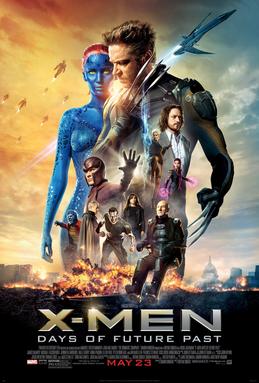
Wars form a central component in "X-Men: Days of Future Past". Yet this latest entry into the X-Men franchise isn't a "war movie" per se. Rather, it's a story about finding peace before the slippery slope of violence takes hold. This resolute sense of morality is just one of the impressive factors at play in this film, which is my latest choice for "Movie of the Week".
The film begins with a prologue, as we get a glimpse at the future. As we find out through Professor X's (Patrick Stewart) narration, a holocaust of sorts has been unleashed on mutants around the world. We see piles of dead bodies, inclusive of mutants and human sympathizers alike. It's all a result of a decision made decades prior, when humans decided to develop robots called Sentinels, which absorb mutant powers in order to exterminate them. In a last-ditch effort to save the mutants from extinction, Professor X devises a plan to send Logan/Wolverine (Hugh Jackman) back in time to change the course of history.
The time travel takes Logan to 1973, during the final days of another losing war - Vietnam. The conflict has taken its toll on humans and mutants alike, with Professor X's Institute for Gifted Youngsters deserted by the large numbers of drafted mutants who perished. The young Charles Xavier is left a broken man, internalizing all the suffering of his fellow mutants, in addition to harboring resentment towards his best friends (Raven Darkholme/Mystique and Erik Lehnsherr/Magneto) who abandoned him. In comes Wolverine to save the day then, hoping to convince this trio (Professor X, Mystique and Magneto) to work together and prevent the events that lead to Mystique's shape-shifting powers being stolen to create the Sentinels.
By setting the plot within the context of the fictional Sentinel war and the controversial Vietnam war, "X-Men: Days of Future Past", immediately shows its intent to reach for grander themes. Just like the future humans (many of whom were persecuted for aiding the mutants) are no better off with the Sentinels, so too did the Vietnam War turn out to be a pointless waste of American lives. The script then links the two, positing the Sentinel program as its own desperate attempt to reinvigorate the human race. As we flash forward to the dystopian future though, the film sends a clear message of the futility of war, forming the foundation for this unexpectedly deep plot.
As it turns out, this is the rare superhero film that gives equal weight to the drama and action. In fact, it may even place more emphasis on its dramatic elements. Unlike the much-maligned "Man of Steel" for example, it strongly considers the consequences of aggression. It addresses the moral issues surrounding friendship, forgiveness and revenge through the relatably human interactions between its mutant characters. Indeed, Logan's mission is mainly one of persuasion, as he urges Magneto, Professor X and especially Mystique to foster peace with the humans, even under attack by Bolivar Trask (the scientist behind the Sentinel program). As such, it allows the film's phenomenal cast to shine, portraying their superhuman characters with unusual vulnerability. Of particular note is James McAvoy, giving a tremendously moving portrayal of a lost man who must find his way again.
This attention to character feeds the action-based thrills too. Specifically, the film wisely acknowledges its extensive cinematic history and trusts that the audience has a pre-existing attachment to the characters. Each setpiece is crafted with a nod to the fans, highlighting the cool powers and distinct personalities of each of the X-Men. The iconography also pays dividends in the heavy tone of the dark future-set scenes, lending genuine gravitas to the idea of mutants in peril. A common criticism of superhero movies is the lack of a true sense of danger and consequences for the protagonists. Well, I can honestly say that in this instance I truly feared for the characters. What's even more impressive is that these emotions were garnered without a bombastic score to force my feelings. It's all due to the film's uniquely character-based design (even the visuals and sound effects aren't showy). The film is therefore unlikely to get any Oscar attention for its technical elements, but that's perfectly fine. It's got the real essentials of a good movie(acting, script, directing), not just superficial blockbuster glitz.
In the end, "X-Men: Days of Future Past" impresses for the ways that it constantly subverts expectations. Instead of building to a triumphant epic showdown, it reaches for a more meaningful, desperate tale of survival. If this is a hint towards an evolution towards more thematically-rich stories in this fantasy-based superhero subgenre (i.e. excluding the inherently "grounded" Dark Knight trilogy), then maybe we can tolerate the endless influx of these movies a little longer.
| Tweet |






No comments:
Post a Comment